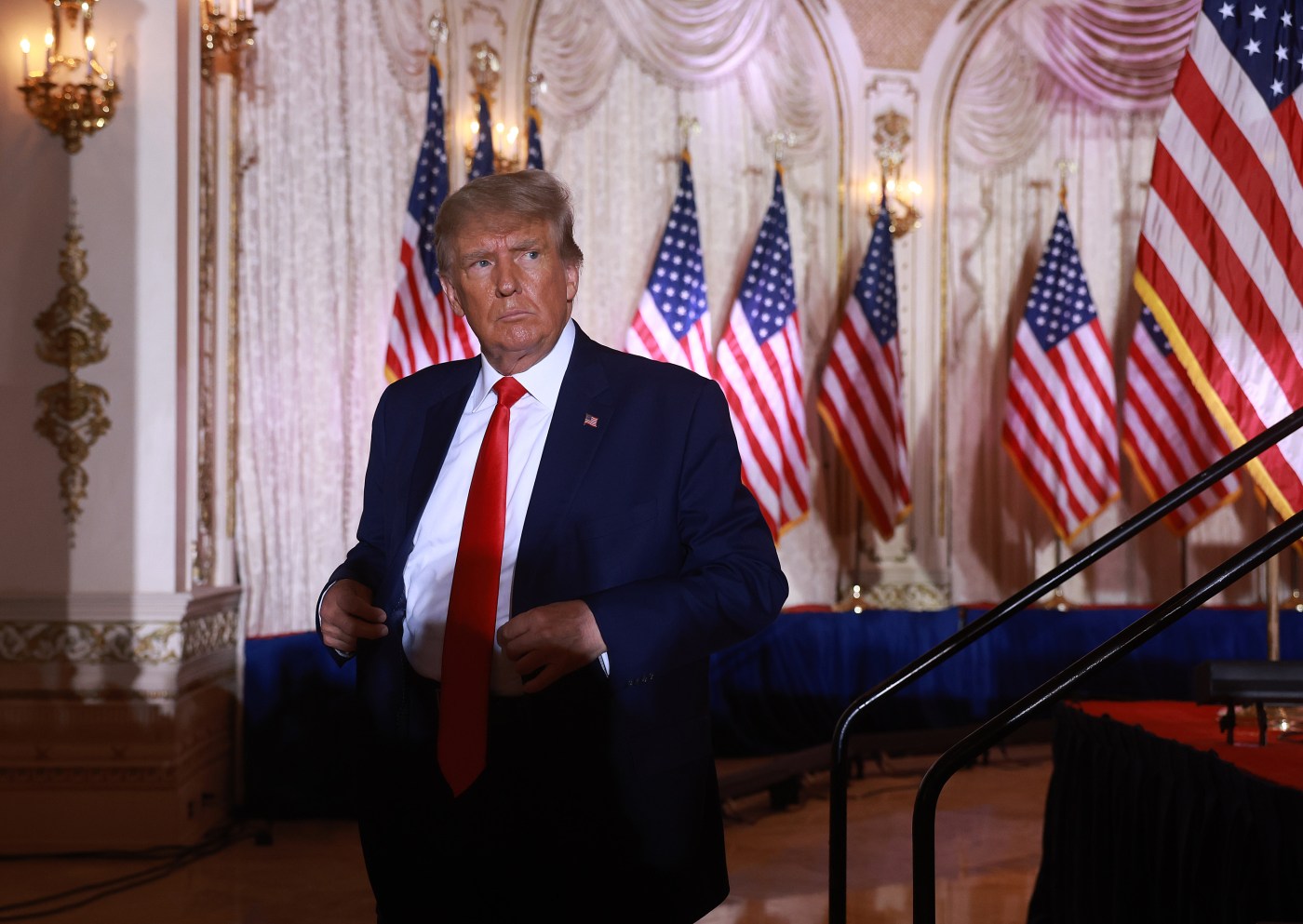
Do presidents have immunity from the law? Trump case to separate ‘official acts’ from crimes
By David G. Savage and Sarah D. Wire, Los Angeles Times
WASHINGTON — There’s a beloved American axiom as old as the nation that “no one is above the law — not even the president.”
Every generation or so, that gets tested in the courts, and it’s about to happen again.
This week, former President Donald Trump will ask a D.C. appellate court — and soon after, likely the Supreme Court — to effectively rule that, well, actually, sometimes a president should be above the law.
Trump is the nation’s first former chief executive to be charged with a crime, but he argues that an ex-president is immune from prosecution for his “official actions” while in the White House.
Related Articles
John Kerry’s Climate office costs taxpayers $4.3M a year, yet he refuses to divulge names
Bay State businesses end year on positive note, mirroring December jobs report
Congressional leaders take step to avert shutdown
Warren warns against removing Trump from the ballot, despite ‘insurrection’
Former Stoneham cop sentenced for using family member’s credit report to rent apartment
Trump was indicted on charges of conspiring to obstruct the official certification of President Joe Biden’s election victory and seeking to defraud Americans of their rightful votes. Trump is charged with four federal felonies and pleaded not guilty to all charges.
The Justice Department has long maintained that a sitting president cannot be charged with a crime while in office. Impeachment is the only remedy for removing a sitting president who breaks the law.
But there is no clear precedent on whether a former president may be prosecuted for what he did while in the White House.
The outcome of Trump’s case could affect all future presidents, potentially subjecting them to prosecution from political rivals who come later.
A ruling in favor of Trump could also upend one of the most internationally admired aspects of the U.S. democratic system: the peaceful transition of government from one opposing political party to another.
Here are some answers to questions about the legal stakes raised by Trump’s immunity claim:
Has the Supreme Court ever shielded a president or ex-president from a criminal case?
No. The best recent example is President Richard Nixon and the Watergate affair.
In 1974, the court unanimously rejected Nixon’s claim of executive privilege and ruled he must turn over his secret Oval Office tapes to a special prosecutor. Though he was not charged while in office, he was not entirely shielded from responding to investigators.
When the tapes were released, Nixon resigned rather than face likely impeachment.
President Gerald Ford then issued a pardon to Nixon before any formal charges were made against the former president.
That was seen as essentially acknowledging that the former president could have been indicted and prosecuted for improper actions taken while in office.
What about the current, more conservative court?
In 2020, the Supreme Court rejected several of Trump’s claims of executive privilege or “absolute immunity” from a criminal investigation.
The court by a 7-2 vote rejected his claim of immunity in seeking to rebuff a New York state subpoena for his business and tax records.
In fact, writing for the court, Chief Justice John G. Roberts Jr. appeared to anticipate and preemptively reject the legal claim that Trump is now asserting.
“The president is not seeking immunity … occasioned by the prospect of future liability,” Roberts wrote in Trump vs. Vance, clarifying the limits of the 2020 case.
Then Roberts continued: “Instead [Trump] concedes — consistent with the position of the Department of Justice — that state grand juries are free to investigate a sitting president with an eye toward charging him after the completion of his term.”
Many interpret Roberts’ statement as confirming a president can be charged after leaving office.
What does the Constitution say about this?
When it comes to presidents, nothing explicitly.
Senators and representatives, for example, were given a limited immunity for actions taken in connection with their legislative work. The Constitution says they shall be “privileged from arrest” and “not be questioned,” except in cases of “treason, felony or breach of the peace.”
There is no similar immunity clause for a president or an ex-president. The Constitution says the president “shall be removed from office on impeachment for and conviction of treason, bribery or other high crimes and misdemeanors.”
It goes on to say that after an impeachment, “the party convicted shall nevertheless be liable and subject to indictment, trial, judgment and punishment, according to law.”
Doesn’t that settle the matter?
Not entirely.
Special counsel Jack Smith argues this confirms what most constitutional authorities have assumed all along: that a former president may be prosecuted after leaving office.
Trump’s lawyers argue this same clause works in their favor. Because two-thirds of the Senate did not convict Trump in his impeachment trial for inciting an insurrection, they say he is not “the party convicted” and cannot be prosecuted now for the same conduct.
If Trump was impeached for his actions, isn’t this double jeopardy?
Most would say no, because the only remedy for impeachment is removal from office.
Trump’s liberty was not at stake because he faced only the loss of his position, not prison. So double jeopardy does not apply.
So what’s Trump’s best legal argument?
The focus on his “official acts.”
Some crimes are obvious, but others depend on an interpretation of what happened. If, for example, it were revealed that a former president before leaving office had secretly schemed to pocket tens of millions of dollars in questionable payments or ordered the killing of a personal enemy, it’s easy to agree those crimes should be prosecuted.
But could a president face prosecution for pursuing a war, ordering the assassination of a terrorist or refusing to prevent illegal crossings of the border?
Trump’s lawyers warned the court to be wary of criminal charges based on a president’s official acts. They predicted such claims will open the door to “cycles of recrimination and politically motivated prosecutions.”
Some worry that if Trump wins reelection in November, his administration could bring criminal charges against a then-former President Biden for the Biden administration’s prosecution of Trump, arguing it amounted to illegal election interference.
Trump’s team has one good precedent on its side. In 1982, the court by a 5-4 vote ruled that a former president may not be sued in civil court for damages related to his “official acts” while in office. He is “entitled to absolute immunity” from damages in such claims, the court said in Nixon vs. Fitzgerald.
Trump’s lawyers say that ruling involving civil claims should be stretched to cover criminal charges.
What’s the special counsel’s best argument?
That brings us back to the ideal that no one is above law, and it’s one embedded in America’s democracy.
Smith says it would be “particularly dangerous” for the courts to rule the president has total immunity from criminal charges.
Doing so “threatens to license presidents to commit crimes to remain in office.” What about a “president who orders the National Guard to murder his most prominent critics; or a president who sells nuclear secrets to a foreign adversary?”
If the president is truly immune when he uses his official power, “the nation would have no recourse to deter a president from inciting his supporters during a state of the union address to kill opposing lawmakers — thereby hamstringing any impeachment proceeding — to ensure that he remains in office unlawfully,” he wrote.
So what is an official act and what isn’t?
That’s the big question, and one the Supreme Court may eventually need to answer.
Trump has argued he was merely taking steps to ensure the election results were accurate, and this was an “official act.”
The special counsel says a jury should decide whether Trump was lying about fraud and scheming to subvert the election.
Some courts have raised the legal theory that Trump was acting as a losing candidate between November 2020 and Jan. 6, 2021, not as a president acting in the nation’s public interest.
Last month, a panel of D.C. appellate judges adopted such a view in a suit against Trump brought by Capitol police officers. They said that while a president may be entitled to immunity for his official actions, this does not extend to his conduct as a candidate. The judges allowed the civil suit to move forward on those grounds.
The bounds of immunity were also tested recently in the 11th Circuit Court of Appeals in Atlanta, where a three-judge panel rejected an attempt by Trump’s White House chief of staff, Mark Meadows, to move the conspiracy case brought against him by Fulton County Dist. Atty. Fani Willis from state to federal court.
The opinion stressed that actions Meadows is accused of taking in Georgia were not official duties of federal officials because states run elections.
That indictment accuses Trump, Meadows and 17 others of a campaign to intimidate Georgia Secretary of State Brad Raffensperger to flip 11,780 votes, lying about election fraud and recruiting fake electors to attempt to replace real votes cast at the electoral college.
What happens next with the immunity case?
Last month, the Supreme Court refused to decide this issue on a fast-track basis, as Smith requested.
But on Tuesday at 9 a.m. Eastern time, the U.S. Court of Appeals for the District of Columbia will hear arguments in the matter.
Audio of the hearing will be available on the court’s YouTube channel.
The three-member panel consists of Judges Karen Henderson, an appointee of President George H.W. Bush, and Judges J. Michelle Childs and Florence Pan, both Biden appointees. The appeals court appears to be fast-tracking the case by scheduling the oral argument just weeks after the appeal was filed.
If Trump loses, his lawyers could appeal to the Supreme Court. But it’s not certain the justices will vote to decide the question at this point. It will likely depend on what the appellate court rules.
Has this dispute stalled the federal criminal case against Trump?
Not yet, but it could.
His trial is scheduled to begin on March 4 in Washington. U.S. District Judge Tanya Chutkan previously dismissed his claim of immunity, and that decision is now the one being reviewed by higher courts.
election 2024
Presidential race
Who’s running for president? A list of 2024 candidates
Feeling caucus confusion? Your guide to how Iowa works
Biden and Trump are poised for a potential rematch that could shake American politics
Congress
Republicans have early edge in new Congress defined by retirements
State supreme courts
What to know about state supreme court races
Voting
Map: See where redistricting challenges continue across the US
Activists who engage with voters of color are looking for messages that will resonate
Election officials see range of threats in 2024, from hostile countries to conspiracy theorists
Polls
More Americans think foreign policy should be a top US priority for 2024, poll finds
Americans sour on primary election process and major political parties, poll says
©2024 Los Angeles Times. Visit at latimes.com. Distributed by Tribune Content Agency, LLC.


